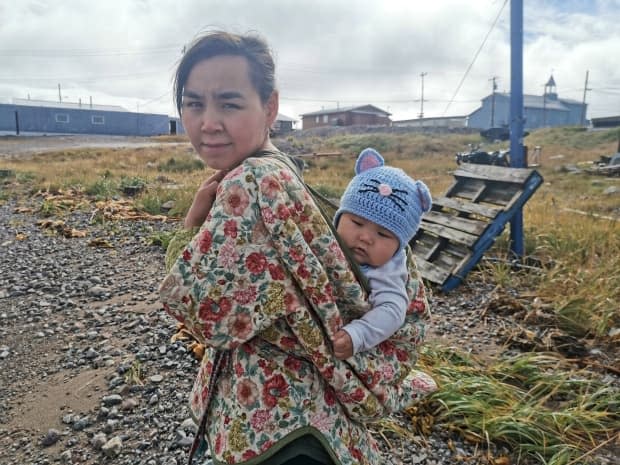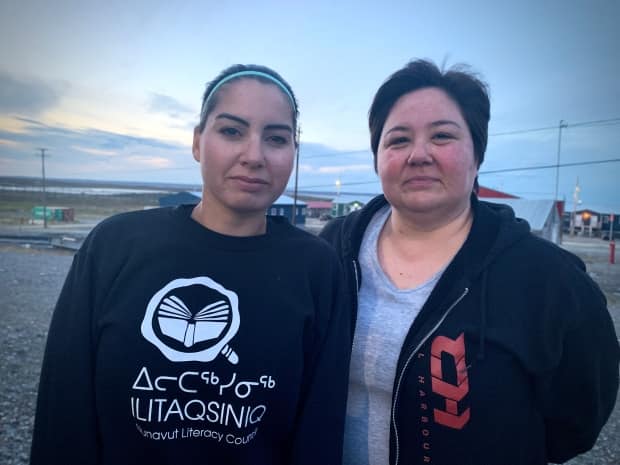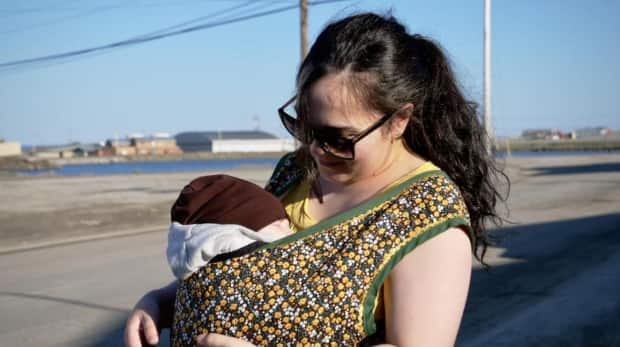'It's 2021': Nunavut mothers say it's high time the territory gets more birthing services

In February of this year, Charlotte Karetak had to travel more than 1,200 kilometres away from her home in Arviat, Nunavut, to give birth to her first child in an unfamiliar setting.
She's one of many women in the territory who have few options when it comes to giving birth, and who often have to travel out of their communities to do so.
Currently, Iqaluit is the only community in Nunavut where women can access birthing services after staffing shortages forced Rankin Inlet to suspend its birthing services in August 2020
At the time, the territory's Health Department said expectant mothers would be assessed and sent to either Iqaluit or Winnipeg to deliver.
Catherine Connelly and Rachel Kaludjak were the first Inuit in Canada to become nationally certified midwives and worked at the Rankin Inlet birthing centre. Connelly left in January 2020 and Kaludjak left in August 2020 because of what they said was overwork and mistreatment.
'We just could not go on anymore'
For several years, the two were the sole full-time providers of labour support in Rankin Inlet, though midwives from the South rotated through. Many women throughout the Kivalliq region relied on the support, too.

"We just could not go on anymore," Kaludjak said, with emotion in her voice. "We were absolutely exhausted."
Connelly said they often "could be on call for weeks at a time without a day off."
While the birthing services at Rankin Inlet have not resumed, prenatal and postpartum services are still offered.
Nunavut's minister of health, Lorne Kusugak, declined CBC's request for an interview about the level of birthing services available in the territory.
'It was really hard on us'
Karetak became pregnant a few months after the pandemic was declared. By the time she was ready to deliver her child, she said travelling to Winnipeg from her Arviat home was her only option.
"I think that took a lot out of us because we weren't sure how long we were going to be [away]," she said.

Karetak was ultimately away from home for two months, partly because her baby arrived nine days late, but also because they were forced to isolate for 14 days on the way home due to COVID-19 restrictions.
"Psychologically, it was really hard on us," she said. "Like, we felt really isolated."
While Karetak said the services she received in the South were good, she wishes she could have given birth surrounded by her culture and with family nearby.
"It was such a big change [of] mindset that you'd have to do in order for you to go and travel down South because it's such a different environment for us," she said.
"It still blows my mind that we don't have [more] services here up North, especially in Arviat, where there's a lot of women who are giving birth every year and the birth rate is very high."

'Desperate' to give birth close to home
Odelia Tartak, who lives in Rankin Inlet, has four children. She said though her oldest was born in Winnipeg, she gave birth to her next two children in Rankin Inlet.
"I really liked that because I got to be home in the comfort of my own … town."
She says part of the reason it was important to her to give birth close to home was so she didn't have be away from her other children for long.
In Winnipeg, Tartak said she had to stay in the hospital for about two days, whereas in Rankin Inlet, she was discharged the same day.

Recently, when she gave birth to her fourth child in Iqaluit, Tartak said it was not by choice but because that was the next option after Rankin suspended its birthing services. She considered staying in Rankin Inlet to give birth but was warned it would be a risk for both her and the baby if anything went wrong.
"I hope they … reopen those services here, because I was desperate pretty much to give birth here."
Another mother, 35-year-old Silatik Qavvik, died in Winnipeg in January. She tested positive for COVID-19 in November 2020, shortly after giving birth.

'Important to have the support'
Jocelyn Merritt, who also lives in Rankin Inlet, said all three of her children were born in town. Her first two labours were through the birthing centre. Her third child, now about four months old, was meant to be born in Iqaluit, but she said her labour happened so fast there was no time to get to the city.

"They knew what they were doing. It was very natural, everything went smoothly," Merritt said. "Of course, I did all my checks before deciding to have my babies here in Rankin Inlet to make sure I was healthy and that the pregnancy was going normal."
She said staying in town and being around supportive family was very important to her and she hopes other women get the chance to give birth in their own communities, too.
"If you are healthy, and you have a very normal pregnancy without any complications … my view on it is that it is important to have the support," she said.
"It's 2021, people should be able to have a baby in their own community."

 Yahoo Finance
Yahoo Finance 